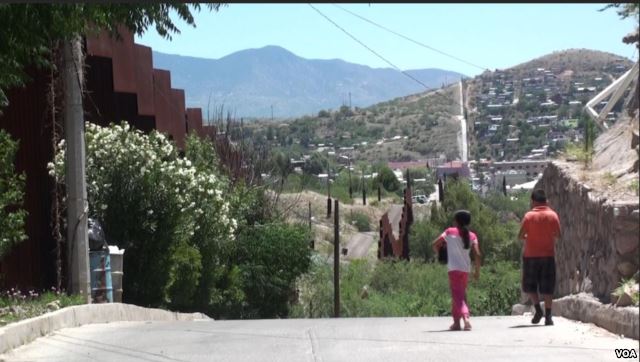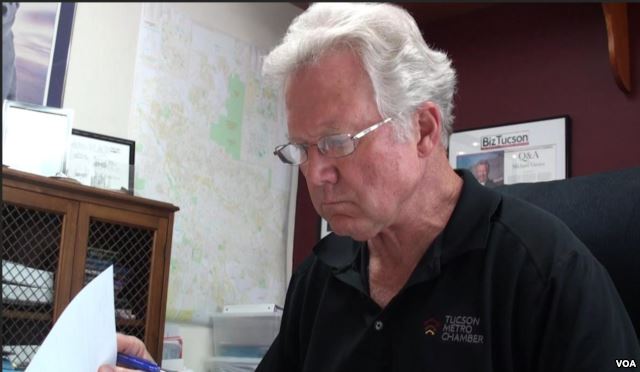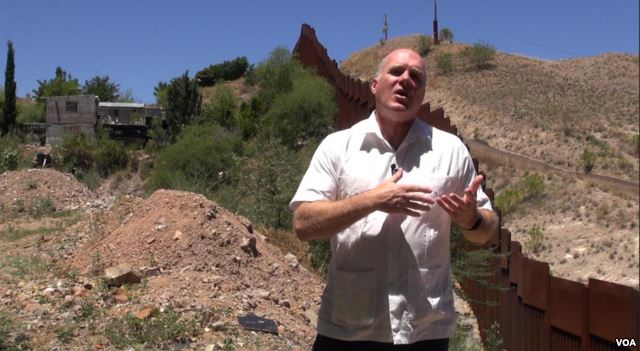BBG Watch Commentary
Quite a few Voice of America (VOA) reports and programs these days violate the VOA Charter, largely because failed managers have hired inexperienced journalists and failed to provide resources and leadership, wasting tax dollars instead on the enormous bureaucracy of the Broadcasting Board of Governors (BBG), VOA’s parent federal agency. Despite these problems, however, some of the veteran VOA reporters, and a few new ones as well, continue to provide excellent and balanced reporting in English and in many other languages.
Serious problems still remain unsolved. New VOA director Amanda Bennett has promised to carry out anti-bias training for VOA journalists in the wake of criticism from Bernie Sanders’ and Donald Trump’s supporters that some of the recent VOA reporting and commentary amounted to “state media” bias against their favored candidates. VOA is funded entirely by U.S. taxpayers ($224 million in FY 2017) and its reports and programs can now be widely received in the United States thanks to the internet and social media. VOA reporting can now affect how U.S. citizens vote and no Republican or Democratic politician wants to see a taxpayer-funded VOA to undermine his or her electoral chances with biased, one-sided reporting. Americans also do not want their tax money to be used to promote only one-side of a controversial policy issue, especially if they disagree with the position being promoted.
BBG Watch has highlighted some of the biased VOA reports on the U.S. presidential election campaign. We have also pointed to a one-sided Voice of America Spanish Service video report on illegal immigrants in the United States, which violated the VOA Charter but which VOA director Amanda Bennett unfortunately praised in one of her notes to staff.
BBG WATCH: “VOA had interviewed Larissa Martinez of Dallas, an illegal immigrant who received a full scholarship to Yale University. According to VOA’s description of the interview sent by Bennett, Martinez reportedly called Republican presidential hopeful Donald Trump’s immigration plan one of ‘hate and prejudice.’ It was obvious that no one from the Trump camp was asked by VOA to respond to the charge or to help explain his position on illegal immigration for the VOA report as required by the VOA Charter. Then a few days later Bennett marked the 40th anniversary of the VOA Charter with the statement that ‘The VOA Charter has never been more important than it is today’.”
In 2014, Ms. Bennett’s husband, Donald E. Graham, a former owner of The Washington Post, created “TheDream.US,” a $25 million fund that promised to award full-tuition college scholarships to students who entered the United States illegally when they were children. Americans have divided views on the issue of illegal immigration as it can be clearly seen from comments left under the Washington Post‘s article about Mr. Graham’s scholarship fund for children of illegal immigrants. When it comes to the Voice of America, which is not a private media outlet like The Washington Post, but 100% funded by U.S. taxpayers, Democrats and Republicans alike, the VOA Charter mandates that these differences of opinion be presented in some form in every VOA report dealing with policy issues over which there is considerable controversy in the United States.
Despite Ms. Bennett’s endorsement of a one-sided VOA Spanish Service report about an illegal immigrant who has received a scholarship to Yale, she has also been issuing statements expressing her strong support for the VOA Charter and even left a comment to that effect for one of the BBG Watch commentaries. We don’t know whether she was aware that the VOA Spanish Service report was one-dimensional and failed to meet VOA Charter requirements, but she should have been alarmed by the description of the report provided to her by VOA managers.
Hopefully, Ms. Bennett’s pro-VOA Charter message will be heard and observed, although that in itself will not solve monumental management problems, for which VOA’s parent agency–the Broadcasting Board of Governors (BBG)–is largely responsible. VOA reporters are “undersold and exhausted,” as one writer put it, while the BBG and VOA management can’t get its act together.
Instead of leadership and solutions from the senior management, VOA journalists are being pacified with medals and empty praises. They are constantly told by managers to do more with less, as new management posts are being filled while dozens of news reporting and other programming positions have been vacated and remain vacant under new leadership of BBG CEO John Lansing.
There is a growing consensus among many BBG employees that BBG Chair Jeff Shell and BBG CEO John Lansing have turned out to be a great disappointment. Critics point to their reliance on some of the failed BBG/IBB executives, their opposition to major structural reforms, and recent questions regarding inappropriate purpose and poor planning of Mr. Shell’s visit to Russia which culminated in his expulsion by the Russian authorities.
But on a positive note, here is an example of a VOA News report that meets the requirements of the VOA Charter and presents both sides of the controversial issue of illegal immigration into the United States.
###
VOICE OF AMERICA
Commerce Thrives on US-Mexico Border
Greg Flakus
July 26, 2016 6:00 AM
TUCSON, ARIZ.—
Speaking at the Republican National Convention last Thursday, presidential candidate Donald Trump reiterated his plans to build a wall on the U.S.-Mexico border and end trade deals that he claims favor Mexico.
The Democratic Party’s presumptive presidential nominee, Hillary Clinton, has criticized such rhetoric and is expected to say more at her party’s convention this week. And last Friday, President Barack Obama hosted his Mexican counterpart, President Enrique Peña Nieto, to underscore the good relations between the two countries.
The benefits of cross-border commerce
Illegal immigration and drug trafficking are the issues most associated with the border in political debates and news reports, but there is also commerce and trade that supports jobs on both sides of the line.
On the border in Nogales, Arizona, cars and trucks line up all day long at the new Mariposa crossing station. Downtown, many Mexicans with visas come across to shop or work and then return across the border later. While about half of Mexico’s population lives below the poverty line, and wages are far lower than they are in the United States, the country has a growing middle class that looks for better bargains on clothes, appliances, electronic devices and other goods north of the border.
“Economic expansion and job growth just doesn’t have the sizzle that a drug bust does, but obviously we cherish the international trade that we enjoy here in Arizona and we want to do everything we can to expand that,” said Mike Varney, President and CEO of the Tucson Metro Chamber of Commerce.
Mike Varney, President and CEO of the Tucson Chamber of Commerce. (G. Flakus/VOA)
Tucson, about 100 kilometers north of Nogales, draws a large share of the Mexican shoppers because of its large stores and other attractions, according to Varney.
“Mexican citizens come to the Tucson area and spend about a billion dollars a year in our stores and our hotels, buying all kinds of services and products here,” he told VOA.
NAFTA, border commerce and the immigration backlash
Even more important, according to Varney, are the cross-border manufacturing projects that have drawn corporations to establish their headquarters or regional offices in Tucson. Such economic activity has been spurred, in large part, by the North American Free Trade Agreement (NAFTA), which has lowered tariffs between the United States, Mexico and Canada since 1994.
But the treaty has drawn fire from critics on both the left and right for displacing some American workers and failing to bring wages in Mexico up anywhere close to the level of wages in the United States or Canada. While manufacturing in Mexico has grown, it still cannot provide enough jobs for the country’s large population of mostly young workers. As a result, Mexicans have continued to cross the U.S. border illegally seeking work opportunities. In their footsteps have come thousands of people from Central America, fleeing not just poverty, but drug-related violence.
Two kids by the border wall in Nogales, Mexico. (G. Flakus/VOA)
Illegal immigration on the U.S.-Mexico border has created a backlash against undocumented immigrants whom critics deride for violating U.S. laws, committing crimes, taking jobs from U.S. workers and suppressing U.S. worker wages through their willingness to work for less. In Arizona, the frustration has been especially pronounced since the U.S. Border Patrol increased enforcement near major urban crossing zones like San Diego, California, and El Paso, Texas, causing more migrants to take their chances crossing over the border into Arizona.
Former Governor Jan Brewer, who backed controversial laws on immigration while in office, remains engaged with the issue, saying recently, “Our borders need to be secured, and we believe in the rule of law.” The most outspoken public figure in Arizona is Maricopa County Sheriff Joe Arpaio, who spoke in favor of Donald Trump’s proposed border wall at last week’s Republican Convention.
Seeking balance at the border
But some Arizonans reject such views and the negative effects caused by what they call the “militarization of the border.” Reverend Randy Mayer, an immigrant advocate from Sahuarita, Arizona, said, “What happens here along the border is that commerce and business is almost stopped and what should be a multibillion dollar industry is actually suffering.”
Reverend Randy Mayer by the border wall in Nogales, Mexico. (G. Flakus/VOA)
Mike Varney does not paint the picture as bleakly, but he does see a need for balance between border security and the free flow of commerce.
“We want to keep bad people and bad things out of our country,” he said, “but, at the same time, we don’t want to put the brakes on cross-border trade.”
Varney argues that there are many entangled issues at the border that require clearheaded examination, not heated rhetoric.
“It’s a mix of politics, it’s a mix of trade and economy, it’s a mix of international relations,” he said, “so it is a complicated recipe and we need to pay attention to all the ingredients that go into that recipe.”
###


